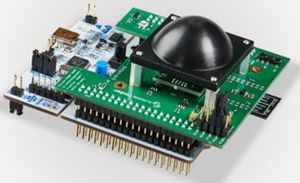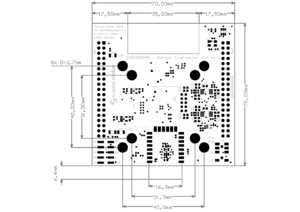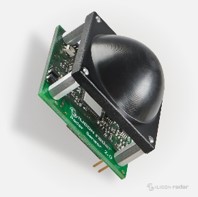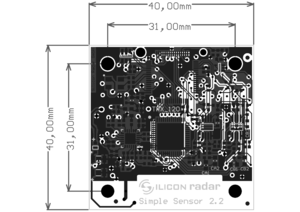Difference between revisions of "Reference Designs"
(→SiRad Simple) |
(→SiRad Simple) |
||
| (27 intermediate revisions by 3 users not shown) | |||
| Line 1: | Line 1: | ||
__NUMBEREDHEADINGS__ | __NUMBEREDHEADINGS__ | ||
| − | + | __TOC__ | |
| − | |||
| − | |||
= General Information = | = General Information = | ||
| − | Radar sensors can be designed with or without using a PLL (Phased Locked Loop). We developed | + | Radar sensors can be designed with or without using a PLL (Phased Locked Loop). We developed our Radar evaluation kits with a PLL-based design. The schematics of these designs are available to customers in [https://login.siliconradar.com/ Customer Download Area]. The designs include front-end control, baseband, analog to digital conversion, digital signal processing option, and data interfaces (control lines, UART, WiFi). There are no HF parts in the designs even though our front ends work with very high frequencies. |
= PLL based Design = | = PLL based Design = | ||
| − | A typical PLL based Radar sensor design | + | A typical PLL-based Radar sensor design consists of a front-end chip, a PLL and loop filter, an amplifier and signal filter, an ADC, and optionally a digital signal processing unit and some data interfaces. While FPGAs and DSPs have been used widely for a long time for Radar processing, also micro-controllers and custom signal processors are used for that purpose today. Our designs include micro-controllers because they are cheap and quite flexible. |
== SiRad Easy == | == SiRad Easy == | ||
| − | SiRad Easy | + | The SiRad Easy can mount our 24 GHz, 60 GHz, 120 GHz & 300 GHz, front-end boards. You can find more information about the Easy kit on the [https://siliconradar.com/evalkits/ Evalkits] info page on our website. We provide the SiRad Easy schematics along with our kit in [https://login.siliconradar.com/ Customer Download Area]. |
| + | {| class="wikitable" style="text-align: left | ||
| + | |+Table 1: SiRad Easy® Reference Design | ||
| + | |- | ||
| + | |[[File:Easy with lens.jpg|thumb|right|link={{filepath:{{PAGENAME:Media:Easy with lens.jpg}}}}|SiRad Easy® with lens]] | ||
| + | |[[File:Easy mechanical drawing.png|thumb|left|link={{filepath:{{PAGENAME:Media:Easy mechanical drawing.png}}}}|Mechanical drawing of the SiRad Easy® Baseband Board]] | ||
| + | |} | ||
| + | </div> | ||
== SiRad Simple == | == SiRad Simple == | ||
| − | SiRad Simple has fixed front end | + | The SiRad Simple has a fixed 120 GHz front end but is smaller than the SiRad Easy. You can find more information about the Simple kit on the [https://siliconradar.com/evalkits/ Evalkits] info page on our website. We provide the SiRad Simple schematics along with our kit in [https://login.siliconradar.com/ Customer Download Area]. |
| + | <div style="overflow-x: auto"> | ||
| + | {| class="wikitable" style="text-align: left | ||
| + | |+Table 2: SiRad Simple® Reference Design | ||
| + | |- | ||
| + | |[[File:Simple.jpg|thumb|right|link={{filepath:{{PAGENAME:Media:Simple.jpg}}}}|SiRad Simple® with lens]] | ||
| + | |[[File:Simple mechanical drawing.png|thumb|left|link={{filepath:{{PAGENAME:Media:Simple mechanical drawing.png}}}}|Mechanical drawing of the SiRad Simple®]] | ||
| + | |} | ||
| + | </div> | ||
| + | <!-- | ||
= Design without PLL = | = Design without PLL = | ||
| Line 31: | Line 45: | ||
Silicon Radar Support Team | Silicon Radar Support Team | ||
| + | --> | ||
Latest revision as of 09:19, 2 June 2021
1 General Information
Radar sensors can be designed with or without using a PLL (Phased Locked Loop). We developed our Radar evaluation kits with a PLL-based design. The schematics of these designs are available to customers in Customer Download Area. The designs include front-end control, baseband, analog to digital conversion, digital signal processing option, and data interfaces (control lines, UART, WiFi). There are no HF parts in the designs even though our front ends work with very high frequencies.
2 PLL based Design
A typical PLL-based Radar sensor design consists of a front-end chip, a PLL and loop filter, an amplifier and signal filter, an ADC, and optionally a digital signal processing unit and some data interfaces. While FPGAs and DSPs have been used widely for a long time for Radar processing, also micro-controllers and custom signal processors are used for that purpose today. Our designs include micro-controllers because they are cheap and quite flexible.
2.1 SiRad Easy
The SiRad Easy can mount our 24 GHz, 60 GHz, 120 GHz & 300 GHz, front-end boards. You can find more information about the Easy kit on the Evalkits info page on our website. We provide the SiRad Easy schematics along with our kit in Customer Download Area.
2.2 SiRad Simple
The SiRad Simple has a fixed 120 GHz front end but is smaller than the SiRad Easy. You can find more information about the Simple kit on the Evalkits info page on our website. We provide the SiRad Simple schematics along with our kit in Customer Download Area.



